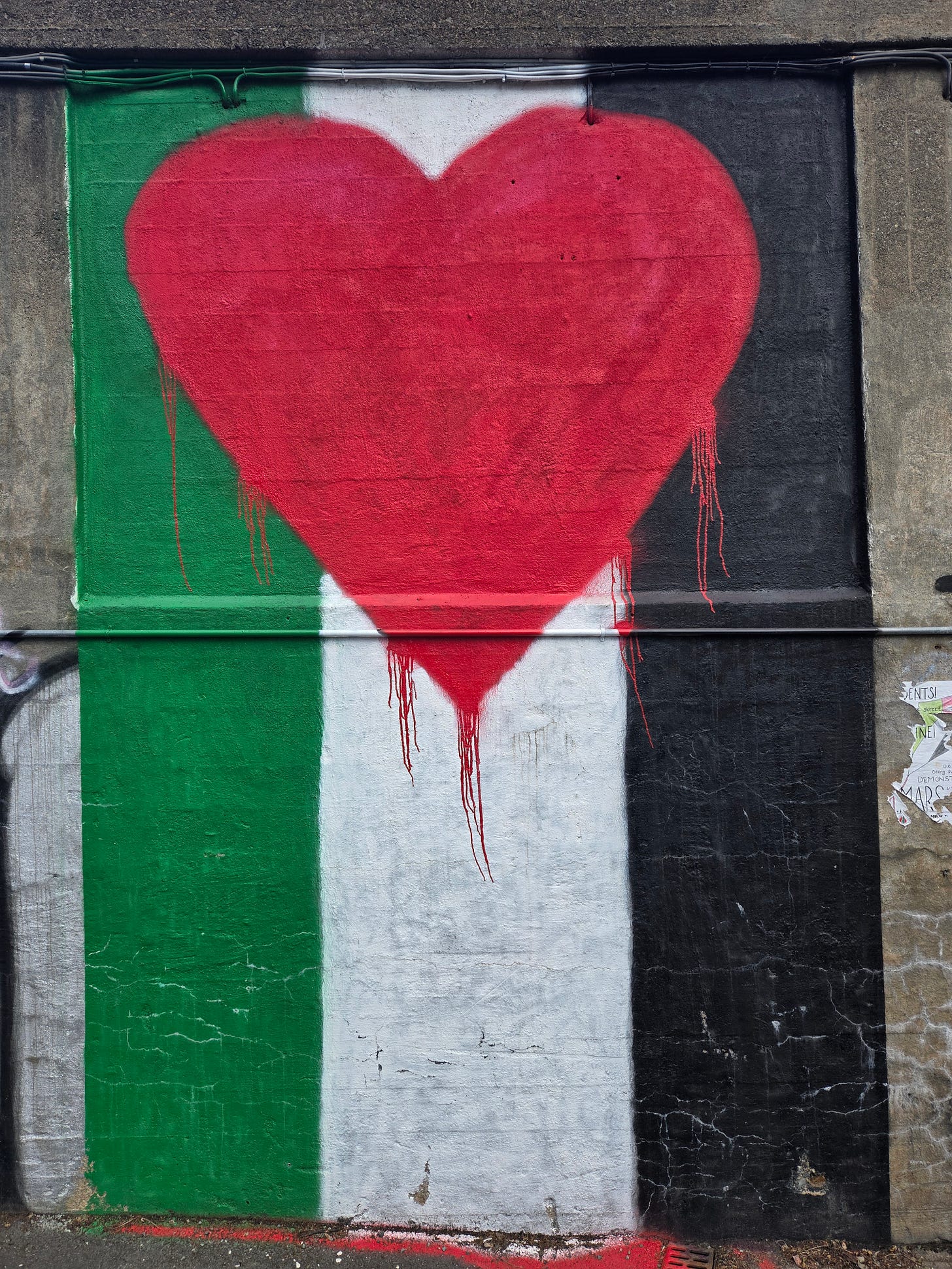Meditations from Marseille: FIFA's silence, Gaza's suffering
My time in Marseille made me reflect on the role sports continue to play in the ethnic cleansing of Gaza, whether through silence, inaction, or a sheer refusal to shun Israel's genocidal war machine.
Welcome to Sports Politika, a media venture founded by investigative journalist and researcher Karim Zidan that strives to help you understand how sports and politics shape the world around us. Our mission is to offer an independent platform for accessible journalism that raises awareness and empowers understanding.
If you share this vision, please consider supporting us by joining our community and becoming a paid subscriber.
Turn down almost any street in the beautiful port city of Marseille, and you’re likely to encounter striking graffiti art—portraits of long-lost heroes, bursts of abstract expressionism, and urgent slogans demanding an end to femicide, world hunger, and queer hate. But by far the most pervasive messages are those expressing solidarity with Palestine—and, more specifically, Gaza.
From raw scrawls etched into walls reading “Fuck Israel” and “Israel Assassin, France Complice,” to haunting murals of children killed in Israel’s brutal bombardment of the besieged strip, the fury and anguish ripple through the narrow alleys of this ancient city, which has stood for more than a millennium.
Marseille has a long-standing maritime tradition. Founded around 600 BCE by Greek sailors from Phocaea, Marseille (then known as Massalia) is one of the oldest cities in France. Its location on the Mediterranean made it an important trading hub for goods, cultures, and ideas between Europe, Africa, and Asia. The city is now home to more than a million people, including more than 250,000 Muslims, mainly French-speaking North Africans, and approximately 70,000 Jewish inhabitants.
As I strolled through Marseille’s streets and took in its protest art, I was reminded of the wave of murders targeting North-African immigrants more than 50 years prior. For several days in 1973, the city became the epicentre of an ‘Arab hunt’ as Le Monde would call retrospectively that series of murders—drownings, stabbings, and lynchings—which took the lives of more than 50 people across France, including at least seventeen in the Marseille region.
The wave of attacks took place shortly following an Algerian man killed a local bus driver Marseille, and were fuelled by the already existing racial tensions linked to the Algerian War. This was coupled with rising anti-Arab sentiments following the 1967 Six Day War, further fuelling the hatred of Arab immigrants. By December 1973, just a couple of months following the Yom Kippur war, a plastic bomb exploded at the Algerian Consulate, killing four persons and injuring 23, many of them seriously. All but one of the victims were Algerian.
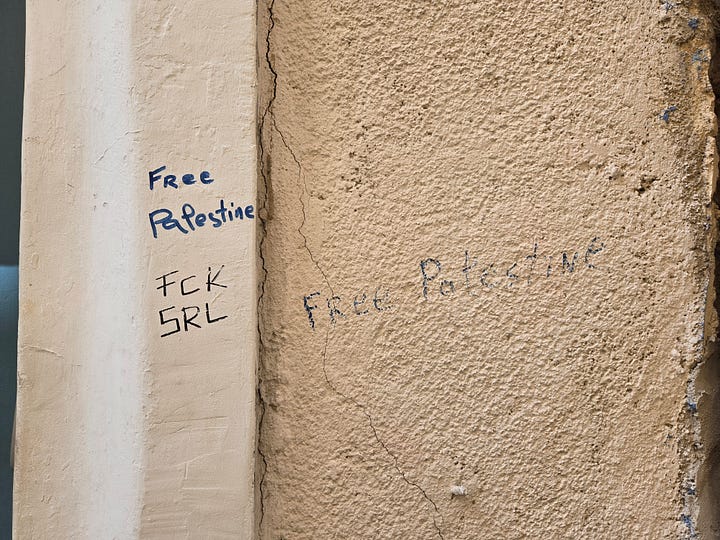
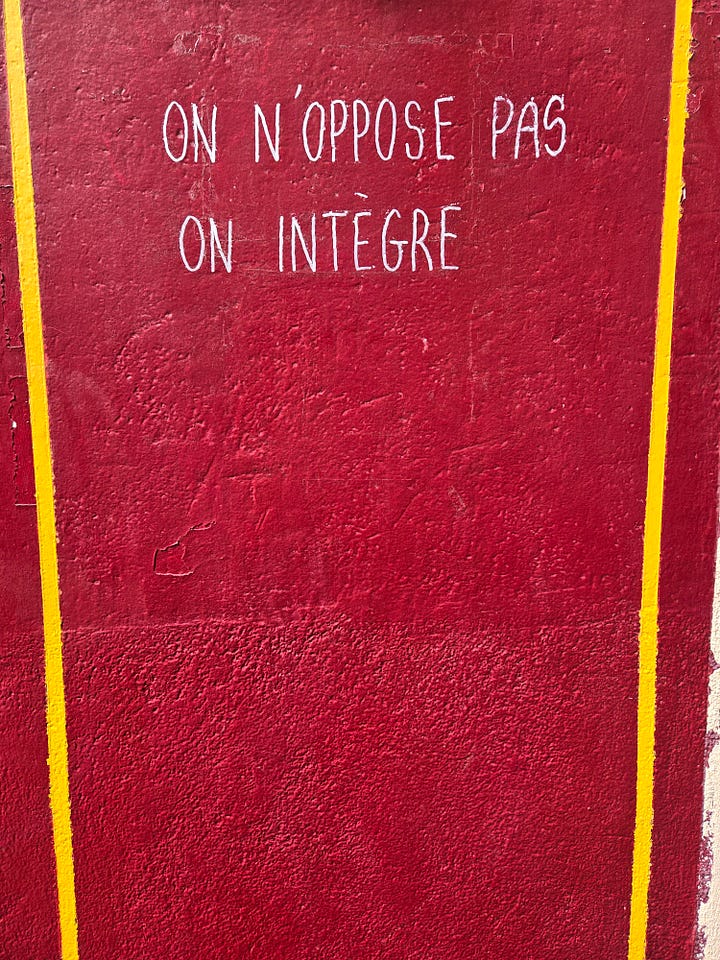
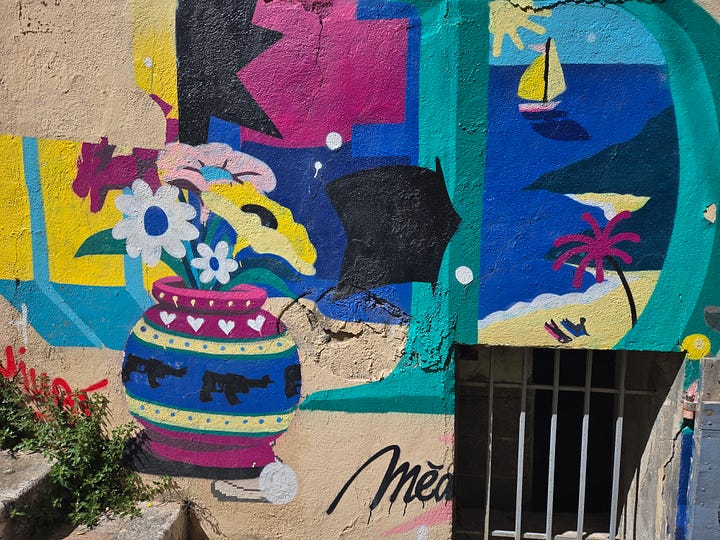
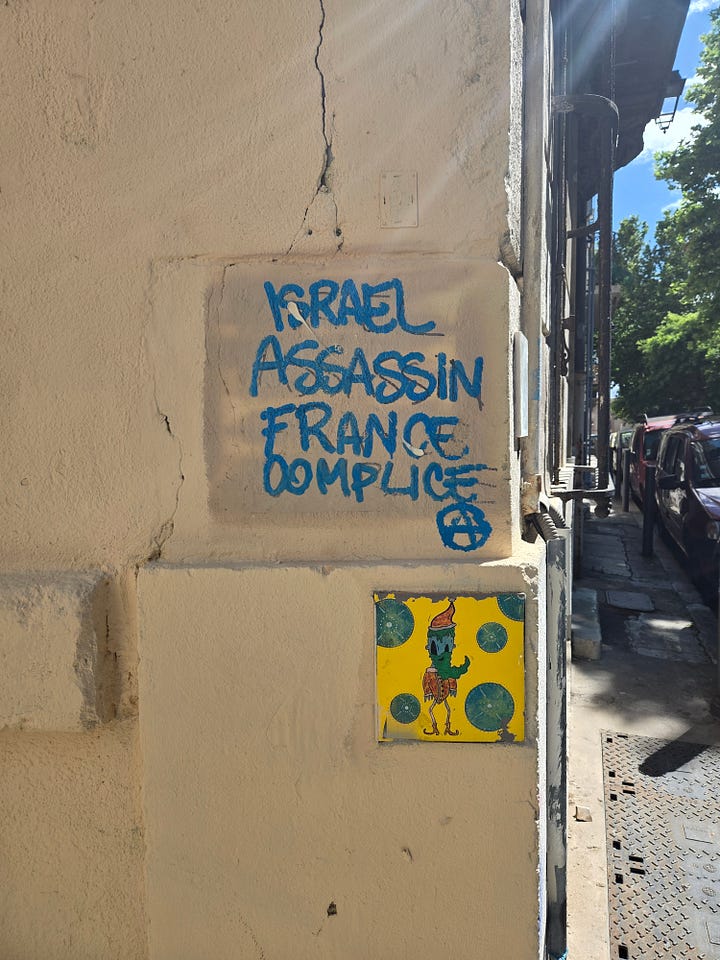
Much has changed in Marseille since then, though the the killings, and the waves of protests that followed, draw parallels with the ongoing protests over the ethnic cleansing of Palestinians in Gaza. Some of the protests were even organized by the association football club Olympique de Marseille, one of the most successful and widely supported clubs in France, which brought together an imam, a rabbi and a priest at the foot of the Notre-Dame-de-la-Garde basilica in Marseille. The three representatives of the Abrahamic religions all called for peace between peoples in a context of war between Israel and Palestine during the October 2023 protest.
My time in Marseille—a city once ranked as Europe’s top sports city—also made me reflect on the role sports continue to play in the ethnic cleansing of Gaza, whether through silence and inaction, or through the refusal to impose the kinds of sanctions that might pressure Israel to halt its relentless bombardment and starvation of the besieged strip.
FIFA has spent more than 20 months dragging its feet and postponing a decision to ban Israel from world football. In May 2024, the Palestinian Football Association submitted a proposal to sanction Israel on the grounds of human rights and humanitarian law violations committed in the Gaza Strip and the occupied West Bank. Since then, several federations and NGOs have filed submissions to FIFA in support of the PFA’s bid.
Initially, FIFA vowed to resolve the issue during an extraordinary council meeting in July 2024, only to postpone the decision to the August 31 council session. FIFA then pushed the decision back again to its October 2024 meeting, where it was once again postponed to allow for “due diligence,” according to FIFA President Gianni Infantino.
Then, at its 75th annual Congress held in Paraguay on 15 May, 2025, FIFA Secretary General Matthias Grafström told the FIFA Congress that two FIFA committees were still investigating the complaint, and that new members of those committees would need time “to appropriately inform themselves on the matter,” eventhough the illegality of Israeli settlements in Palestinian territory is not a contested issue but a matter of fact.
FIFA’s inaction goes against the organization’s supposed claim that football unites the world, and that football can serve as a vehicle for peace. It is also a staunch example of the organization’s hypocrisy, given its willingness to ban Russia from international football following its invasion of Ukraine (Author note: FIFA actually didn’t have much of a choice in banning Russia, as several European countries had refused to complete against Russia, leading to a crisis that forced FIFA and UEFA’s hand. European countries have not, however, taken a similar stance against Israel.)
However, several European countries are reportedly planning to take action against Israel’s participation in international sports.
Earlier this week, Spanish newspaper Mundo Deportivo reported that Spain is spearheading an initiative within the European Union to eliminate Israel from all continental sports competitions over its ethnic cleansing of Palestinians in the besieged Gaza Strip. Spanish Minister of Education, Vocational Training and Sports Pilar Alegría revealed that her nation is prepared to open discussions regarding Israel’s exclusion from all sports, including in international tournaments.
The coordinated effort with the European Union is the latest example of the international backlash to Israel’s genocidal destruction of Gaza. Several weeks ago, the leaders of the United Kingdom, France and Canada released a joint statement that “strongly opposed” the expansion of Israel’s military offensive in Gaza, threatening to “take concrete actions” if Israel does not lift restrictions on aid supply to Gaza, which Israel has cut off for almost three months. It signalled a shift in opinion on Gaza, as all three of those countries had previously backed Israel’s right to self-defence when Benjamin Netanyahu’s government launched a devastating offensive in Gaza on October 7, 2023.
The Israeli military resumed bombardment of Gaza on March 18, 2025, shattering the 2-month ceasefire agreement with the Palestinian militant group Hamas and the deal on the exchange of Israeli hostages with Palestinian prisoners. At least 53,901 Palestinians have been killed, many of whom are women and children. At least 715 athletes are among those killed, as of January 2025. More than 375 of the victims were football players, Hany Al-Masdar, including Mohammed Barakat, Gaza’s first centurion of goals and a former national team player known as the “Legend of Khan Younis.”
The PFA has since dedicated a section of its website to the athletes killed during the past 15 months, including pictures of the victims. Some were teenagers with dreams of turning professional; others were fathers pictured with their smiling children.
Despite the destruction of Palestinian sports, the Palestinian national team remains in contention to qualify for the 2026 World Cup. After struggling in their qualifying group earlier this year, Palestine scored twice in the final minutes to secure a historic 2-1 win against Iraq. The result leaves Palestine four points behind fourth-placed Oman with two games to play. The Fedayeen will now face Oman and Kuwait to determine whether they will progress to the next stage. Given everything that has happened over the past 20 months, reaching the World Cup would be nothing short of a miracle.
And right now, we could all use a miracle.
Sports Politika is a media platform dedicated to the intersection of sports, power and politics. If you like what you see, upgrade to a paid subscription ( or gift a subscription if you already have your own). We would appreciate if you could also like the post and let us know what you think in the comment section below.



